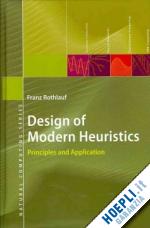
Questo prodotto usufruisce delle SPEDIZIONI GRATIS
selezionando l'opzione Corriere Veloce in fase di ordine.
Pagabile anche con Carta della cultura giovani e del merito, 18App Bonus Cultura e Carta del Docente
Most textbooks on modern heuristics provide the reader with detailed descriptions of the functionality of single examples like genetic algorithms, genetic programming, tabu search, simulated annealing, and others, but fail to teach the underlying concepts behind these different approaches.
The author takes a different approach in this textbook by focusing on the users' needs and answering three fundamental questions: First, he tells us which problems modern heuristics are expected to perform well on, and which should be left to traditional optimization methods. Second, he teaches us to systematically design the "right" modern heuristic for a particular problem by providing a coherent view on design elements and working principles. Third, he shows how we can make use of problem-specific knowledge for the design of efficient and effective modern heuristics that solve not only small toy problems but also perform well on large real-world problems.
This book is written in an easy-to-read style and it is aimed at students and practitioners in computer science, operations research and information systems who want to understand modern heuristics and are interested in a guide to their systematic design and use.
This book is written in an easy-to-read style and it is aimed at students and practitioners in computer science, operations research and information systems who want to understand modern heuristics and are interested in a guide to their systematic design and use.
This book is written in an easy-to-read style and it is aimed at students and practitioners in computer science, operations research and information systems who want to understand modern heuristics and are interested in a guide to their systematic design and use.
Chap. 1.- Introduction.- Part I.- Fundamentals.- Chap. 2.- Optimization Problems.- Chap. 3.- Optimization Methods.- Part II.- Modern Heuristics.- Chap. 4.- Design Elements.- Chap. 5.- Search Strategies.- Chap. 6.- Design Principles.- Part III Case Studies.- Chap. 7.- High Locality Representations for Automated Programming.- Chap. 8.-Biased Modern Heuristics for the OCST Problem.- Chap. 9.-Summary.- References.- Nomenclature.- Glossary.- Index
Prof. Rothlauf completed his PhD thesis in 2001 at the University of Bayreuth, supervised by David E. Goldberg of the Illinois Genetic Algorithms Laboratory (IlliGAL). His particular areas of interest are optimization and heuristics, particulary in the areas of transportation, logistics and business information systems. He chaired the main international conference on evolutionary computing, ACM GECCO, in 2009, and has co-organized many related conferences and workshops; he has also acted as guest editor for related journal special issues; and he published the book "Representations for Genetic and Evolutionary Algorithms" in 2002, this was published in a second edition in 2006.











Il sito utilizza cookie ed altri strumenti di tracciamento che raccolgono informazioni dal dispositivo dell’utente. Oltre ai cookie tecnici ed analitici aggregati, strettamente necessari per il funzionamento di questo sito web, previo consenso dell’utente possono essere installati cookie di profilazione e marketing e cookie dei social media. Cliccando su “Accetto tutti i cookie” saranno attivate tutte le categorie di cookie. Per accettare solo deterninate categorie di cookie, cliccare invece su “Impostazioni cookie”. Chiudendo il banner o continuando a navigare saranno installati solo cookie tecnici. Per maggiori dettagli, consultare la Cookie Policy.